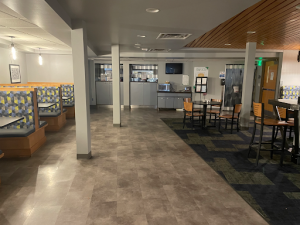For a long time, Concordia College’s Maize has been a popular spot for students and faculty alike to sit down, enjoy a savory meal, converse with one another and work on assignments — sometimes all at once.
Located in the Knutson Campus Center, the Maize is a restaurant-style café that offers a variety of American staples, ranging from burgers and french fries to soups and wraps.

In previous years, the Maize has been open for business from 8 a.m. until 10 p.m. Since it reopened for this semester on first-year student orientation day, however, it has not operated for a full day; some days, the Maize has been shut down altogether.
According to Anthony Boersma, a Concordia alumnus and the retail operations supervisor at Concordia, these modifications to the Maize’s schedule are primarily a consequence of limited student workers.
An optimal number of workers for a shift in the Maize, Boersma says, is about five; while that number was easily attainable in the past, getting three workers at any given time has become a daunting task this fall.
Business hours are not the only consequence of the staff shortage in the Maize. Certain foods that are either too complex to make or take too much time to prepare have been cut from the menu. Another change in the establishment is the loss of the made-to-order sandwich bar.
“The sandwich bar requires an entire person to stand there and make sandwiches, so if there gets to be a line, I can’t sacrifice somebody to put over there,” Boersma said.
Hours have been reduced in the Korn Krib and the Coffee Stop as well. The Krib closes at 10 p.m., rather than midnight, and the Coffee Stop closes at 2 p.m., rather than 4 p.m.
Shanyn Reidle is a junior student employee and is disheartened by working so many hours on top of her schoolwork.
“Many Cobbers have found jobs elsewhere such as Starbucks and Chick-fil-A because DS no longer has competitive pay. Go to Target and you’ll see signs advertising that their pay starts at $15 an hour,” she said.
“As an employee, it’s frustrating to be involved in an issue that you don’t have much control over,” she added.
Though there might be additional outside factors contributing to the lack of students applying for work with Concordia’s food services, the pandemic and its ramifications are at the root of the dilemma.
When the number of coronavirus cases in the Fargo-Moorhead area was at its peak last year, the Maize was forced to cut back on its hours even more drastically than it has this semester, alongside many other food and retail operations at the college. Consequently, many students who depended on their work with the school for financial assistance were forced to find work off campus. Because students through the years tend to return to the jobs that they are acclimated to once summer concludes and classes are back in full swing, many of the student workers lost last year did not return this semester.
While the pandemic has led to significant financial issues, its impact has extended to the emotional well-being of its workers, too.
Accompanying the many requirements instituted on campus in hopes of slowing the spread of the coronavirus is a general sense of disconnection among members of the Cobber community. According to Danielle Ginther, a Concordia senior and student manager for food services at the college, some of the relatively recent rules such as masks and social distancing have altered the dynamic between student workers and customers.
“You don’t connect with people like you used to in customer service,” Ginther said. “You feel very cut off.”
Despite the many limitations still in place on campus, the restrictions set in place have begun to lessen. Masks, for instance, are now only a strictly enforced requirement for settings such as the classrooms, laboratories, studios and other indoor areas where effective social distancing cannot be accomplished. During the 2020-2021 academic school year, the number of individuals allowed to sit in a booth or at a table, for instance, was much more monitored than it is this semester.
Dominic Erickson also contributed to this story.

